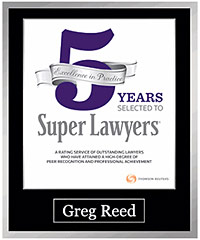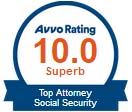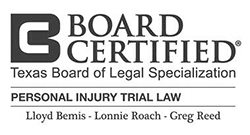Breast Cancer can qualify for Social Security Disability
Can I get disability benefits if I am suffering from the effects of Breast Cancer?
Author: Attorney Greg Reed
Updated: 3/29/2024
Clara stared at the application for disability benefits, a flicker of hope igniting in her chest.
The past months with breast cancer had been a whirlwind of doctor visits, surgery, and the ever-present fatigue. Working had become a struggle, the once-simple tasks now a daunting challenge. Despite her initial reluctance, the mounting bills and doctor’s recommendations nudged her towards this path. As she filled out the forms, a sliver of relief washed over her. This wasn’t giving up; it was acknowledging the battle she faced and seeking the support she deserved. The road ahead might be uncertain, but with this decision, Clara felt a renewed sense of possibility, a chance to focus on her health and fight the cancer with a little less burden.

If you are suffering from the effects of Breast Cancer and have been denied disability don’t give up, almost 70% are denied initially! Just call 512-454-4000 for a free, no obligation consultation to learn what your options are.
Unfortunately, Clara’s story is not unusual.
Breast cancer is the most common cancer in women in the U.S. with approximately 240,000 cases diagnosed each year. Men can also develop breast cancer, but the risk for men is much lower with only one in 1,000, compared to one in eight for women. Even though there is a high rate of remission, the side-effects of treatments can last a very long time, taking a toll on the body and mind, and leaving a person unable to work.
Can I qualify for Social Security Disability if I have breast cancer?
If you have breast cancer and are unable to work for at least one year after diagnosis, you may be eligible for Social Security Disability Income, but first you must satisfy the financial and medical requirements set forth by the SSA.
- Financial Requirements:
- Medical Requirements:
- a carcinoma that has spread to the lymph nodes or other organs;
- a locally advanced cancer that has spread to the chest, skin or deeper in the breast;
- a carcinoma that returns after treatment;
- a small-cell (oat cell) carcinoma; or
- secondary lymphedema (swelling when something affects the lymphatic system, such as surgery, or radiation therapy).
Before you are eligible for Social Security disability benefits, you must satisfy some basic financial requirements.
You must: 1) have a disability that has lasted or is expected to last 12 months; and 2) you must have worked in a job where you paid Social Security taxes long enough and recently enough; and 3) you must not earn more than Substantial Gainful Activity (SGA), which is $1,550 per month in 2024 for nonblind applicants and $2,590 per month for blind applicants. If you earn more than the SGA amount, your claim will be denied, and if you have not worked enough recently to earn the necessary amount of work credits, Social Security will deny your claim.
If you are suffering from Breast Cancer and have been denied disability don’t give up, almost 70% are denied initially! Just call 512-454-4000 for a free, no obligation consultation to learn what your options are. Have some questions? just give us a call, we love to help folks just like you!
Breast cancer can greatly affect your ability to work.
Treatments such as surgery, radiation and chemotherapy cause pain, fatigue, headaches, depression, mood swings and memory loss. You may be unable to use your arms and may have difficulty concentrating and following instructions. Even if you have a sedentary job, fatigue may cause you to miss too many days of work. The Social Security Administration recognizes breast cancer as an impairment under Section 13.10 in its Blue Book, a manual which lists medical conditions Social Security considers disabling and may automatically qualify for benefits.
To qualify under this listing, you must be able to show you have at least one of the following:
You should discuss with your doctor regarding whether your cancer meets any of the above criteria.
In severe cases you may qualify for a Compassionate Allowance and the Social Security Administration may be able to expedite the application process. Under this program, Social Security flags cases that are particularly severe and accelerates the claim process. Social Security recommends that claimants provide definitive medical evidence with their application; be sure to submit your complete medical records to the SSA when first applying to speed the process, including
- Mammograms
- Biopsy results
- Oncologist reports
- Surgeon’s notes
Keep track of your work absences.
Once Social Security determines your limitations caused by your condition, they will have a vocational expert assess whether a person with those same limitations is employable.
Some applicants who are in the early stages of breast cancer may not meet the listing requirements because their cancer has not spread or returned after treatments.
However, you may still qualify if you are able to prove that you are unable to work and there are no jobs you can do. Social Security will conduct a Residual Functional Capacity assessment to evaluate your functional limitations, both physical and mental, in a work environment. Treatment for breast cancer can cause pain, fatigue and weight loss. Social Security will be looking for restrictions on how much weight you can lift and how long you can stand as well as whether you can do skilled or unskilled labor. If Social Security decides you cannot do your old job or don’t have the skills to perform a new job, you may be approved for a Medical-Vocational Allowance.
If you are 55 or older or have another medical condition you may get approval.
Social Security follows a set of rules to determine when the agency expects an applicant to learn a new job.
Applicants who are 55 or older often fall under a grid rule, which means they are not expected to learn a new job. For example, a 55-year-old applicant with no transferable skills might be found disabled. If you can’t go back to your old job, and you don’t have the skills to learn a new one, Social Security will likely grant you disability benefits.
Disability for those over 55 –>
You may also be eligible for Social Security Disability benefits if you have another medical condition, such as arthritis.
One disorder alone may not meet the criteria of an impairment as stated in Social Security’s Blue Book, but if you have more than one medical condition, Social Security must consider how those health issues combined limit your ability to hold a job and perform necessary daily tasks.
Disability for Multiple Impairments –>
Should you file a claim?
If you believe that you meet Social Security’s medical and financial requirements, you should apply for benefits.
If you are still unsure or would like to talk to someone, please contact us at 512-454-400. We are always ready to take your call and discuss your options with you free of charge. We are happy to help folks just like you find the best solution for their personal situation.
How do I file for Social Security Disability benefits?
Once you have decided to file a claim, you can take the first step and apply for Social Security Disability benefits in person at your local Social Security Administration office, online, or over the phone.
After your application is submitted, Social Security will send your file to the state’s Disability Determination Services office (DDS). A claims examiner will request and review your medical records and may call you for an interview or additional paperwork. When the claims examiner has enough information, Social Security will make a decision and notify you by mail. Normally, this takes three to four months, but could take longer. Don’t be discouraged if your initial application is denied – most are – and you will have the opportunity to appeal.
There are four steps to the Social Security appeal process:
- File a Request for Reconsideration with the Social Security Administration to completely review the case.
- If you don’t agree with SSA’s response to your Request for Reconsideration, you can request a hearing before an Administrative Law Judge (ALJ). ALJs are attorneys who work for the Social Security Administration; they review SSDI cases and either uphold or overturn decisions to deny SSDI benefits. If you are not represented by an attorney at this point, now is the time to obtain legal counsel. This is a critical point in the process and will raise your chance for success.
- If an ALJ does not grant your claim, you can request that the Appeals Council review your case.
- Federal Court review. The final step in the appeal process is filing suit in U.S. District Court.
Do I need a disability attorney for SSDI?
If you have breast cancer and cannot work, you may be eligible for Social Security Disability benefits, but qualifying is a complicated process.
You may certainly file a claim on your own, but evidence shows that your chances for approval are increased significantly if you have legal representation. At each potential stage of the process, from the initial application stage to the reconsideration stage and the ALJ hearing stage, an attorney can assist you in completing the detailed forms and questionnaires required by Social Security, collecting and submitting relevant medical evidence, and preparing questionnaires for your doctors. At the ALJ hearing phase an attorney will not only continue to assure that the evidence is complete, but prepare you for questioning by the ALJ, prepare an argument on your behalf and question any doctors or vocational experts selected by the ALJ to testify at the hearing. At the Appeals Council and federal court level, a lawyer can present legal arguments to show your case was wrongfully denied. Fees charged by disability attorneys are regulated by federal law and are usually 25% of disability backpay you are owed. There are no out-of-pocket costs, and if you don’t win your case, you won’t be charged anything.
What if I don’t qualify for SSDI?
If you haven’t worked long enough to earn enough work credits, or if you earn too much income, you may be eligible for disability benefits through another Social Security program, such as Supplemental Security Income (SSI), or from a long-term disability insurance plan through your employer or a privately purchased policy.
SSI is a program that pays monthly benefits to people with limited income and resources who are disabled, blind, or age 65 or older. SSI is based on income instead of work credits, and is financed by general funds of the U.S. Treasury. You can check eligibility requirements and begin the application for SSI online or by calling Social Security at 1-800-772-1213. https://www.ssa.gov/ssi/text-apply-ussi.htm. In addition to SSDI and SSI benefits, you may be able to get financial assistance from a privately purchased long-term disability policy or a policy through your employer.
I have long-term disability insurance – should I file a claim?
Absolutely – you should file a claim as soon as you become disabled.
Long-term disability insurance (LTD) protects your income if you are unable to work due to illness or injury and is purchased as part of a group employment plan or privately through an insurance company. Policies pay between 50-60% of your salary and benefits continue until you return to work or for the number of years stated in the policy. However, do not quit your job before you file a claim because LTD coverage is good only as long as you are employed, and be sure to check your policy’s definition of “disabled” as each policy will state the definition of “disabled” which is in use. Also, be aware that long-term disability insurance companies can require a claimant to also apply for SSDI.
Do I need a disability attorney for a long-term disability insurance claim?
It doesn’t matter if you have a long-term disability insurance policy purchased through a private insurance broker or a group policy purchased with your employer; filing a claim for long-term insurance is a complex process.
The wording of LTD policies from companies such as Aetna, Cigna, Unum, Hartford and MetLife can be confusing and the laws and regulations which affect the two types of LTD insurance differ in procedures for filing claims and appeals. An experienced LTD attorney with thorough knowledge of ERISA laws and regulations will avoid mistakes and increase your chance of success. They will act on your behalf, completing your application and filing your claim in a timely manner. They can also negotiate a settlement or file an appeal for you. If it becomes necessary to file suit, an LTD attorney can prepare your case against an insurer. Most LTD attorneys handle cases on a contingency basis and charge approximately 25%-40% of a claimant’s past due benefits. You do not pay an attorney’s fee unless the attorney wins your case.
Filing a claim for disability benefits and getting approval can be a long journey, but you can take the first steps today. Feel free to call us for a free consultation to discuss your case and options. Even if you don’t hire us, we are happy to help you make the best choices for your own individual situation.
At The Texas Disability law firm Bemis Roach & Reed, our attorneys are committed to helping injured or disabled clients receive the benefits they deserve. Mr. Roach is AV Preeminent and SuperLawyers rated and has become a recognized leader in the field of Long Term Disability law. Mr Bemis focuses his practice on Social Security disability while Mr Reed handles both LTD and SSDI claims. Both are AV Preeminent and SuperLawyers rated and all our attorneys have been successfully helping people fight for their rights against big insurance companies and the government since 1993. If you have applied for benefits and been denied call 512-454-4000 for a free consultation and get help NOW.
Try these links for further reading on this subject:
Social Security Disability Insurance Qualifications
Cancer and Qualifying for SS Disability Benefits – A Lawyer’s Advice
Can you get disability for skin cancer?
Author: Attorney Greg Reed has been practicing law for 29 years. He is Superlawyers rated by Thomson Reuters and is Top AV Preeminent® and Client Champion Gold rated by Martindale Hubbell. Through his extensive litigation Mr. Reed obtained board certification from the Texas Board of Legal Specialization. Greg is admitted to practice in the United States District Court - all Texas Districts and the United States Court of Appeals-Fifth Circuit. Mr. Reed is a member of the Travis County Bar Association, Texas Trial Lawyers Association, past Director of the Capital Area Trial Lawyers Association, and an Associate member of the American Board of Trial Advocates. Mr. Reed and all the members of Bemis, Roach & Reed have been active participants in the Travis County Lawyer referral service.
Your Free Initial Consultation
At Bemis, Roach and Reed, if we can't help you, we will try to find the right attorneys for you.
We offer each of our prospective clients a free no obligation one hour phone or office consultation to see if we can help you and if you are comfortable with us. We know how difficult a time like this can be and how hard the decisions are. If we can be of assistance to you and help you find a solution to your issue we will even if that means referring you to another attorney.
Or simply call
512-454-4000
to schedule your
Free Consultation
Let's get you Started:
If you could provide us with some basic information about your claim we will get right back with you with a free case evaluation and schedule your Free Consultation Today.










